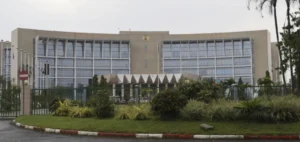An oil depot located in Sotchi, a city in southwestern Russia, was hit overnight by a fire triggered by an attack from Ukrainian drones, according to local authorities. No injuries were reported following the incident, which required the intervention of more than one hundred firefighters on site. The affected depot, situated near the Black Sea, holds a strategic position within the regional logistics network.
Emergency response mobilisation and traffic disruptions
The governor of the Krasnodar region, Veniamin Kondratiev, stated that drone debris struck a tank containing petroleum products, causing the fire. During the night, 127 firefighters were deployed to contain the blaze, while the mayor of Sotchi, Andrey Prokhorunin, confirmed that the situation was “fully under control” and that no casualties were to be deplored. Rescue operations continued to fully extinguish the fire.
The incident caused a temporary suspension of air traffic at Sotchi International Airport. The civil aviation authority confirmed the resumption of flights after the area was secured, emphasising the swift intervention of emergency teams.
Ukrainian strikes on Russian oil infrastructure
Ukraine regularly conducts operations targeting oil and gas facilities in Russia in response to attacks on its own territory since the armed conflict began in 2022. Ukrainian drone strikes on Sotchi remain rare, as the city lies more than 500 kilometres from the front line. At the end of July, two people were killed in similar attacks in the region, according to local authorities.
The Russian Ministry of Defence reported intercepting three Ukrainian drones in the Leningrad region, which includes Saint Petersburg. Ukrainian officials have not yet publicly commented on the Sotchi attack or the fire declared overnight.
Ukrainian retaliation and regional consequences
Russian night strikes were also reported in Ukraine, affecting the regions of Mykolaiv, Kharkiv, Zaporizhzhia, and Kherson. According to Ukrainian Prime Minister Iuliia Sviatenko, seven people were injured in Mykolaiv, while several other regions recorded multiple injuries following bombardments.
Air and ground operations continue to impact the entire energy sector of the region, contributing to persistent instability in hydrocarbon markets. Authorities from both countries are discussing additional measures to protect critical infrastructure amid intensifying hostilities.






















